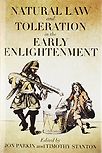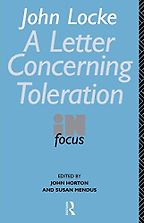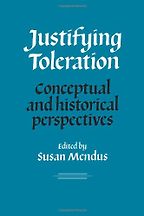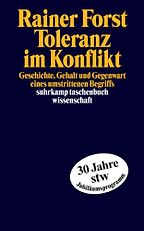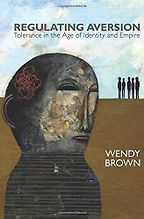Could you explain the idea of toleration and tell us about your first book choice, John Locke’s A Letter Concerning Toleration?
Toleration is an ideal of conduct, which involves putting up with something you find objectionable – you disapprove of it, or you dislike it. You can do that as an individual, or a society can do it, and the ideal is one that’s become pretty well entrenched within liberalism. The reason I started with Locke is because his arguments about toleration are the touchstone of modern discussions of toleration within the liberal tradition. He’s not the first person ever to say anything about toleration – if you look at the history of human beings living together anywhere at any time, you’ll always find examples of people recommending something that looks like toleration, because it’s very hard to see how a human society could go on at all if people refused to put up with the things they disliked or disapproved of. Locke’s argument is capable of being construed in lots of different ways. Some people construe it as a pretty instrumental argument without much positive content, but I would tend to understand it differently from the way in which a lot of contemporary analytical philosophers have taken it.
In what sense?
Well, most philosophers see it as something pretty simple: in their view, Locke’s argument is that it’s futile to try to coerce people into believing something other than they do, because that’s not how belief works. Belief isn’t susceptible to coercion. So it doesn’t make any sense, is irrational, to try to coerce people into believing something other than they currently do.
Let’s talk about John Stuart Mill and On Liberty.
Mill’s argument is very different in its setting from Locke’s. It’s about what happens when imperatives to religious conformity and uniformity of belief have dribbled away, when hanging and burning are off the agenda. Mill thinks that the space that was occupied by a more or less successfully imposed religious monoculture will be occupied now, if we’re not careful, by a tyranny of majority opinion. His worry is that the everyday prejudices and opinions of ordinary people would become a kind of monolithic structure which gradually pulls everyone into its ambit, such that everyone starts to act and believe and think in the same way.
Five Books interviews are expensive to produce. If you're enjoying this interview, please support us by donating a small amount.
So is Mill’s idea to guard against some kind of mob rule? Perhaps the kind of outpouring of public opinion that you get when there’s something slightly distasteful?
That’s right up to a point. Mill doesn’t worry overmuch about the mob ruling through politics (most of the mob didn’t have the vote, after all). He takes for granted that the kind of institutional settlement that followed the English revolution of 1688, in which you’ve got the slow development of a constitutional monarchy, will stick – it’s OK, we don’t need to worry about absolute rulers imposing their will on the people, and we need not really fear ‘the people’ imposing their will on everyone else by seizing political power directly for itself, but we do have to worry very much about a mass of people imposing their will on everyone else through society. And it’s that really – the idea that you need to have the liberty of thought and discussion in order to improve society, and to save it from the stultifying effects of uneducated opinion. He thinks that individuality is a good thing in itself, in a romantic way, but also seems to think that by allowing the liberty of thought and discussion, including the liberty to make mistakes, that that has a positive effect overall.
Your next recommendation is Justifying Toleration, edited by Susan Mendus, which is a collection of papers.
I picked this book because it is an important marker of the renewed interest in toleration in the 1980s and 90s. A lot of writing prior to this tended to be about the historical tradition of thinking about toleration and its development as an idea. But this book really marks the appearance of toleration in modern political theory as an idea to be engaged with, and it contains many important and still influential papers about toleration both historically and as a philosophical idea.
Your next book is in German – what is Toleranz im Konflict about?
This is a book by Rainer Forst, a professor at the University of Frankfurt. He is part of a tradition of thinking there, which runs from Habermas and Karl-Otto Apel, to Forst. He tells me, jokingly, that it’s about toleration ‘from Jesus to Forst’, which explains why it’s 900 pages long! But, more seriously, it’s a book about the role of toleration in defusing, ameliorating and regulating conflict, and about conflicts within the idea of toleration itself. It’s being translated into English at the moment and will be published by Cambridge University Press as part of the Ideas in Context series. What Forst wants to do is restore to some kind of centrality a figure called Pierre Bayle who’s quite well known in historical circles but less known by contemporary political theorists. Bayle was writing around the same time as Locke and both wrote about toleration in the 1680s in response to events in France – specifically, to the revocation of the Edict of Nantes, which had granted toleration to generations of French Protestants. Locke’s A Letter Concerning Toleration was paralleled by Bayle’s Commentaire Philosophique, a book about one justification for trying to impose religious conformity.
How does that come into Forst’s book?
What Bayle was trying to do was to develop a different justification for toleration, against imposition, which revolved around respect for individual conscience. What Forst says, to put it very generally, is that we need to think about the reasons that could plausibly be given to ground coercion. His thought is that you can’t give any reasons that would be acceptable to everyone, to impose a single way of life on them. He calls this a respect concept of toleration and he roots it in Bayle in the first instance, but of course he sees it as having been developed in other ways by other thinkers too, not least Habermas. His book is partly about toleration in relation to the legitimate exercise of force and partly an argument for a certain view of toleration, which moves away from the Lockean view in a broadly similar direction. It’s certainly the most ambitious modern attempt to argue about toleration.
Your last book is Regulating Aversion by Wendy Brown. Tell me about it.
Brown thinks there’s a big problem with the language of toleration. Take something like a particular form of religion that you don’t like: once you’ve identified it as your target, you impose various forms of toleration on it, chopping it up to fit into the various categories by which you organize toleration, and in doing that you change the thing itself. You make something new, that isn’t the thing you were originally averse to. So that religion stops being a comprehensive thing that makes demands on every aspect of your life, and becomes just a set of beliefs that you hold or a set of rituals you choose to perform or a set of tastes in food and dress that you happen to have. The sense of certain ways of life as laying categorical demands on people drops out of sight: the tolerated thing is changed by virtue of being tolerated. Brown thinks that it’s damaging for liberals to adopt the language of tolerance, because it moves them away from higher ideals like equality and justice and reinforces the status quo.
She thinks that view of tolerance played a part in setting up things like the war on terror and the war in Iraq.
That all seems a bit indiscriminate to me, really. Everything criminal or stupid the Bush regime ever did is related to some pervasive problem that comes out of the language of toleration. This strikes me as a bit implausible. But the surpassing thought is just that there’s an imperialist ambition behind liberalism, that’s the basic idea: liberalism wants to colonize the rest of the world, and it does it in a particularly sneaky and surreptitious way in Brown’s view because it uses the language of tolerance and inclusion, while imposing very specific demands on other people and other ways of life.
Get the weekly Five Books newsletter
It’s important not to impugn her motivations, or the seriousness with which she has thought about these issues. But I think there’s a difficulty with the way she goes about things because there’s a deep vein of self-aversion running through the work – not personal self-aversion, but aversion to American regimes from Reagan onwards. It misses the important truth that, however bad, unjust and intolerant present-day America is, it’s probably better to be a citizen of America than a lot of other countries in the world. I think it’s a bit too easy to turn on America, to see it as an empire of illiberalism, hiding its illiberalism behind the language of tolerance.
October 5, 2009. Updated: December 1, 2023
Five Books aims to keep its book recommendations and interviews up to date. If you are the interviewee and would like to update your choice of books (or even just what you say about them) please email us at [email protected]

